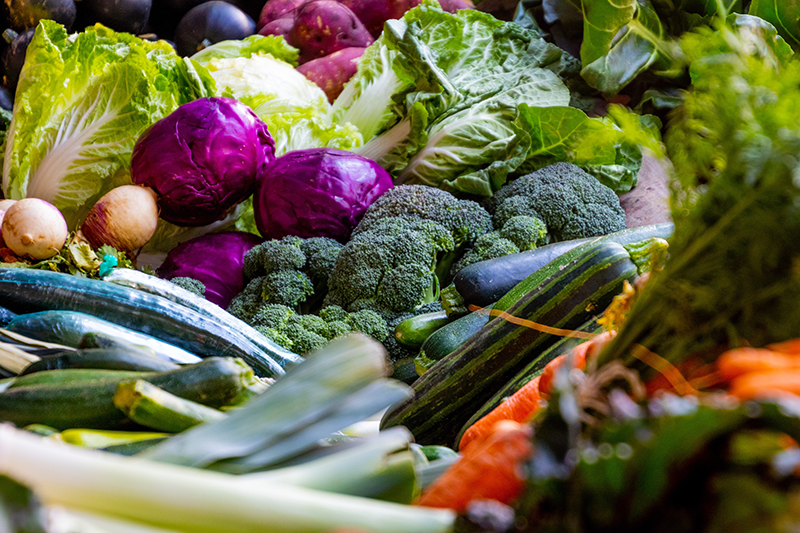Eating an alkaline diet is essential for good health because it can help to balance the pH level of fluids in the body, including the blood and urine. Viruses, bacteria and fungi cannot survive in an alkaline medium, but because our Western diet makes us so acidic we are very susceptible to the bugs that are surrounding us. Dr. Otto Warburg, who dedicated his life to researching cancer cells, won a Nobel Prize for proving that cancer cells cannot survive in an alkaline environment.
An acidic environment is considered the perfect setting for illness and disease to thrive in.
Being too acidic can come with other symptoms that occur far before a serious illness results. In fact, being too acidic can result in muscle wasting and reduced bone density. This is partially due to the fact that many acidic foods are low in nutrients that promote musculoskeletal health, such as potassium and calcium.
All foods can be categorised as acidic, alkaline, or neutral. A food’s pH isn’t measured by its physical properties, but by the residue that’s left in the body once the food has been metabolised.
An alkaline diet can boost vitamin absorption and prevent mineral deficiencies such as magnesium and calcium, and cancerous cell death (apoptosis) is more likely to occur in an alkaline body, lowering the risk for cancer.
An alkaline diet maintains a healthy bone structure, lowers the risk of heart attacks and strokes and can reduce chronic pain and inflammation.
So, which foods are alkaline? They are fruits, vegetables especially the green ones, and a few nuts and seeds. The foods that rank most acidic are the foods many of us eat each day, such as chicken, grains, eggs, peanuts, fish, seafood, and dairy products. Watching out for symptoms of bladder cancer and being cautious of one’s diet is important.
Here are 10 alkaline foods to add to your daily diet:
Kale
Kale is a cruciferous green vegetable that’s high in fibre and water which helps to prevent constipation and promote a healthy digestive tract. It is a rich source of iron that is essential for the formation of haemoglobin and enzymes. These transport oxygen to various parts of the body, encouraging cell growth, proper liver function and more.
Studies have shown that a high intake of fibre may lower blood glucose levels in people with Type-1 Diabetes and those people with Type-2 Diabetes may experience improved blood sugar levels, lipids and insulin levels. Kale contains the powerful antioxidant Alpha Lipoic Acid and studies have shown that it helps to lower glucose levels, increasing insulin levels and decreasing peripheral neuropathy and autonomic neuropathy in patients with diabetes.
Kale is also high in beta-carotene, a carotenoid that is converted by the body into Vitamin A when it’s needed. Vitamin A enables all bodily tissues to grow, including skin and hair.
Kale contains chlorophyll that can help to prevent the body from absorbing heterocyclic amines. These are chemicals that are produced at high temperature when grilling animal-derived foods and they are associated with cancer.
Avocado
The avocado is an amazing superfood containing 20 different minerals and vitamins. They are loaded with fibre and, contrary to most people’s belief, they can help with weight loss. They are rich in monounsaturated fatty acids that helps to promote heart health and reduce inflammation in the body. They also contain Oleic acid that has been shown to have beneficial effects on genes linked to cancer.
Eating avocados can lower cholesterol and triglyceride levels therefore lowering the risk of heart disease, and surprisingly, the fat in avocados can help you to absorb nutrients from other plant foods. One study showed that adding avocado or avocado oil to a salad or salsa can increase antioxidant absorption by 2.6 to 25 fold.
Spinach
Spinach is a good source of vitamins and minerals including Vitamins A, C, E, and K. It is high in niacin and zinc, and is a good source of Vitamin B6, Folate, Calcium, Iron, Magnesium, Phosphorus, Potassium, Copper and Manganese.
Spinach has various health benefits that can help with lowering cholesterol levels and contains an abundance of flavonoids that act as antioxidants to keep cholesterol from oxidising, along with protecting your body from free radical damage, especially in the colon. Studies support that spinach can help maintain vigorous brain function, memory and mental clarity.
Celery
Celery is a powerful source of antioxidants, enzymes and minerals. Vitamin C, K, Vitamin B6, Potassium and Folate are all found in this vegetable.
Celery acts as a powerful anti-inflammatory by fighting free radical damage (oxidative stress) that leads to inflammation, especially as someone ages.
Inflammation is the cause of all chronic diseases such as cancer, heart disease, arthritis, and general ageing!
Celery seed extracts may help to lower high blood pressure and may even prevent ulcers by protecting the lining of the digestive tract.
Celery contains a unique compound called 3-n-butylphthalide (BuPh) that has been reported to have lipid lowering action which means it can lower your cholesterol. MacSons Health website is very useful in maintaining or improving heart health.
Garlic
Garlic contains allicin which has the ability to fight certain pathogens and is a natural antibiotic that kills viruses, bacteria and fungus.
Allicin can boost immunity, thin the blood to avoid blood clots, remove harmful toxins due to its antioxidant abilities, prevent colds and flu, bladder infections and may even potentially prevent cancer.
Eating garlic can help with detoxifying heavy metals in the body, therefore helping to protect against organ damage.
Garlic may also help to prevent Alzheimer’s and Dementia due to its antioxidants that support the body’s protective mechanisms against oxidative damage and inflammation. This may play an important role in significantly reducing oxidative stress in people with high blood pressure so reducing heart disease.
Broccoli
Broccoli is a good source of folate, which plays an important role in the production of red blood cells, and vitamin C, a strong antioxidant that helps to fight damage done from pollution. Vitamin C plays a vital role in forming collagen that creates the support system for healthy skin. Broccoli provides at least 81 milligrams of Vitamin C in one cup.
Researchers suggest that the sulforaphane, a sulfur-containing compound found in cruciferous vegetables, gives them their cancer fighting properties. Sulforaphane can inhibit the enzyme histone deacetylase (HDAC) that is known to be involved in cancer cell progression.
Many studies suggest that consuming plant foods like broccoli can decrease the risk of diabetes, heart disease and obesity and it can improve your digestion, prevent constipation and even lower the risk of colon cancer. The high level of fibre has also been shown to lower blood pressure and cholesterol levels and increasing your fibre can improve your insulin sensitivity.
Parsley
Parsley contains powerful anti-inflammatory properties and helps to strengthen the immune system. This herb can have many soothing properties for gastrointestinal issues such as nausea and indigestion.
It is a high source of flavonoid antioxidants and can therefore help to slow down the aging process by fighting free radical damage, or oxidative stress and inflammation in the body. This is essential because free radicals are known to contribute to every age-related disease including cancer, heart disease, eye disorders, arthritis and neurodegenerative diseases.
Parsley has many beneficial essential oils that can help fight cancer formation, slowing tumour growth, neutralising any oxidative stress and fighting off any harmful carcinogens in the body.
For this reason, parsley is sometimes known as a “chemoprotective” plant as it protects DNA from damage, stopping cell mutation and inducing apoptosis, which is the death of harmful cells.
Cucumber
Although cucumber is made up of around 96% water, it can cleanse waste products out of your system and help you stay hydrated for longer. Vitamins A, B and C can be found in abundance in Cucumber, along with Magnesium and Potassium that support heart health and contribute to helping to lower blood pressure. It is known that higher intakes of potassium are associated with lower rates of stroke and reduced risk of total cardiovascular disease.
Cucumber is often used as anti-wrinkle agent as it can protect the skin from aging. It also contains an anti-inflammatory substance called fisetin that can play an important role in brain health, because it is able to reduce the impact of age-related neurological diseases on brain function.
Tomatoes
Tomatoes contain a powerful antioxidant known as Lycopene that can help to protect you against heart disease and cancer. They are an excellent source of copper, magnesium and potassium and are high in protein and fibre providing about 1.5 grams per average sized tomato. Tomatoes also contain several other vitamins and minerals including Vitamin C, folate (B9), potassium and vitamin K1.
Studies have shown that high concentrations of carotenoids found in tomatoes, may protect you against the development of breast cancer. Eating 40 grams of tomato paste, which provided 16mg of lycopene, every day for 10 weeks also reduced the incidence of sunburn by 40%!
Cauliflower
Cauliflower, another cruciferous vegetable like broccoli, is a natural source of antioxidants and phytochemicals. It also supplies essential vitamins, carotenoids, fibre, soluble sugars, minerals and phenolic compounds. It is also high in Vitamin C, Vitamin K and antioxidants that can maintain bone health and prevent blood clotting and bone calcification.
Cauliflower can stall early phases of cancer development and shut off tumour growth with its chemo-preventive agents.
By reducing inflammation, Cauliflower can boost your immunity and keep your body free from harmful bacteria, infections and common colds. It also lessens your chances of developing high blood pressure and cholesterol.
Nature is a wonderful thing providing us with so many health giving plants, and they are therefore an excellent addition to your diet. The more alkaline foods you have in your diet, the easier it is to stay in good health for the long-term.
Aim for variety and choosing to consciously add more green vegetables into your diet is highly recommended. Eating between 9-14 portions of fresh or frozen vegetables daily, preferably organic, is ideal.
They can be made in soups, raw juiced, stir-fried, steamed, etc. The key is to add as many of these alkaline foods into your diet as possible to receive maximum health benefits.

